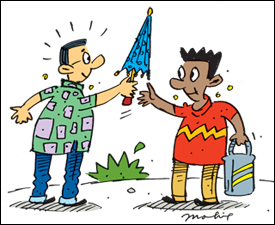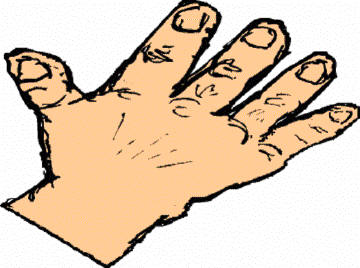|

by R. S. Karunaratne
How to use ‘may’ and ‘might’
‘May’ is a modal verb
used to express possibility.
There may be other problems connected with his job.
You may see me in office tomorrow.
The fire may have been caused by a faulty electrical
connection.
You can buy the sari, but your mother may not like it.
|

Take this umbrella with you. It might
rain in a little while. |
‘Might’ is also a modal verb used to
express the possibility that something will happen or be done, or that
something is true although not very likely.
Don’t go any closer - it might be dangerous.
The rain might have stopped by now.
In general, we use ‘may’ or ‘might’
to indicate that something is a possibility.
What you say may be true.
What you say might be true.
He may go home now.
He might go home now.
To form the negative, we add ‘not’ to
‘may’ or ‘might’.
The teacher may not come.
The teacher might not come.
What he says may not be true.
What he says might not be true.
He may not have money today.
He might not have money today.
For the past we use ‘may have’ or
‘might have’ + past participle of the verb.
I may have read 100 novels.
She might have given alms to beggars.
The baby may have been asleep when mother entered the room.
Where is my camera?
You might have left it in office.
I didn’t see Kamala in the class room.
She might have gone to the principal’s office.
|

The fire may have been
caused by a faulty electrical connection. |
Father was in a bad mood yesterday.
He may not have been feeling well.
Sometimes ‘could’ has a similar
meaning to ‘may’ and ‘might’
I hear a bell ringing. It could be the postman.
I could have left office early.
However, ‘couldn’t’ is different from
‘may not’ and ‘might not’.
I was in my car, so she couldn’t have seen me.
Sometimes we can use ‘may’ and
‘might’ to indicate future actions or happenings.
I am not feeling well. I may go home early.
Take this umbrella with you. It might rain in a little while.
All the trains are late. We might have to wait for a few hours.
When the situation is not real, we
can use only ‘might’ not ‘may’.
If I knew the answer, I might tell you.
Match the word in column ‘A’ with the words denoting numbers in
column ‘B’. Check your answers with the key.
Column A
01. A number of actors
02. A number of servants
03. A number of people following a funeral
04. A number of beautiful ladies
05. A number of soldiers
06. A number of sailors in a ship
07. A number of thieves
08. A group of constables
09. A number of judges
10. A number of directors
11. A collection of poems
12. A collection of books
13. A collection of pearls
14. A collection of flowers
15. A number of drawers
16. A number of ships
17. A number of trees
18. A large collection of trees
19. A collection of hay
20. A number of stars grouped together
Column B
A. constellation
B. stack
C. forest
D. clump
E. fleet
F. chest
G. bouquet
H. rope
I. library
J. anthology
K. board
L. bench
M. posse
N. gang
O. crew
P. army
Q. bevy
R. cortege
S. staff
T. company
Key: 1. T, 2. S, 3. R, 4. Q, 5. P, 6. O, 7. N, 8.
M, 9. L, 10. K, 11. J, 12. I, 13. H, 14. G, 15. F, 16. E, 17. D, 18. C,
19. B, 20. A.
------------------------***************
Kinds
of sentences
A sentence may be a statement , a question , or an exclamation . Each
of these sentences ends with a different punctuation mark.
Statement
A sentence that tells something, or states a fact, is called a
statement. A statement ends with a full stop or a period.
She took a photo of us.
Manel picked the largest cake on the plate.
The washing-machine has stopped functioning.
Maya listened to me with a puzzled expression on her face.
You are not supposed to attend school on Sundays.
Question
A sentence that asks something is
called a question. A question ends with a question mark.
Who broke this window?
What’s your surname?
How do you pronounce this word?
Which bird has white feathers?
When were you born?
Where are my books?
Exclamation
A sentence that shows strong feeling
or surprise is called an exclamation. An exclamation ends with an
exclamation mark.
What a dreadful idea!
Ugh! she exclaimed.
He said, “Thank you!”
The notice said:
WELCOME TO SRI LANKA!
---------------------
One word for many
In column ‘A’ we give
words denoting places. In column ‘B’ you find single words to match each
place. Match them and check your answers with the key.
Column A Column B
1. A place where birds are kept A. Drey
2. A place where bees are kept B. Den
3. A place where fishes are kept C. Burrow
4. A place where rabbits are kept D. Dovecot
5. A place where pigs are kept E. Pen
6. A place for breeding insects F. Stable
7. The house of an Eskimo G. Kennel
8. The house of a Swiss peasant H. Kabitka
9. The house of an Arab I. Kraal
10. The house of an American Indian J. Caravan
11. The house of a gipsy (also gypsy) K. Wigwam
12. A Zulu village L. Dowar
13. The house of a Kirghis M. Chalet
14. A shelter for a dog N. Igloo
15. A shelter for a horse O. Insectarium
16. A shelter for a cow P. Sty
17. A box for pigeons to live Q. Hutch
18. The dwelling - place of an animal R. Aquarium underground
19. The home of a lion S. Apiary
20. A squirrel’s home T. Aviary
----------------------
‘I spy’ game
Here is an interesting game for starters. Look at the pictures given
here and identify them. The first letter is given to make your task
easy.
 |
 |
 |
 |
 |
|
This is a H - - - |
This is a S - - - - |
This is a B - - - |
This is a H - - - |
This is a R - - - |
|

